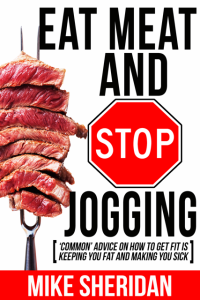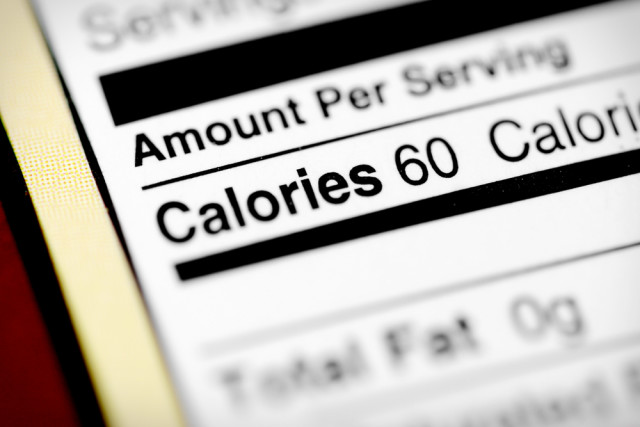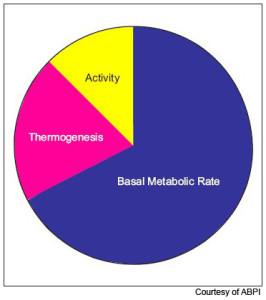At least one-third of the North American population is obese and more than two-thirds overweight.
Conventional wisdom says its because we take in more energy (calories) than we burn. Implying that our unfit, unhealthy body is our fault, because we lack the discipline to walk away from our plates or commit to a calorie burning fitness regimen.
But, the problem isn’t you. It’s this misconception that losing weight is all about eating less and exercising more. That’s why you’ve lost and regained in the past, and that’s why you continue to struggle today.
Weight Loss = Muscle Loss
Losing ‘weight’ shouldn’t be your goal, because this usually results in muscle loss. And depending on the composition of the calories you consume (fat, carbs, protein), or the severity of the restriction, this could be extremely high.
Research suggests that nearly 40% of weight lost in a caloric deficit is muscle.
Aside from the long-term health consequences of less muscle, this reduces something called the basal (or resting) metabolic rate – the number of calories we burn while sedentary. Which actually accounts for 60-75% of our total energy expenditure.
Choosing the rice cakes instead of the steak may please the scale in the short-term, but as you continue to lose muscle your daily burning (metabolic) rate will continue to fall. Meaning less food will be needed to put on weight, as the ‘gain’ or ‘caloric excess’ threshold has been reduced.
This consequence grows in significance when you remember the muscle loss we’re already fighting with age.
- Slow Phase – 25-50yrs old = 10% muscle loss
- Rapid Phase – 50-80yrs old = 40% muscle loss
Less Calories = More Fat
Regardless of our caloric intake, there are certain areas of our body (brain, liver, gastrointestinal system) that require a considerable amount of energy to function on a daily basis. If at any point our body feels that energy is in short supply, it will do whatever is necessary to conserve it.
“When deprived of food, animals employ various behavioral, physiological, and structural responses to reduce metabolism, which prolongs the period in which energy reserves can cover metabolism.” – Annual Review of Physiology, 2006
Though decreasing our metabolic rate is quite effective for conserving energy, our body also secretes hormones that motivate us to consume more, and stockpiles fuel reserves in case we run short. Reducing a hormone called leptin, that makes us hungrier and less likely to burn fat.
The sad part is, these hormonal changes can persist long after a crash-diet and over-exercise plan. Leaving you ravishingly hungry with a higher tendency to gain long after the restricted period.
A 2011 study in the New England Journal of Medicine identified low leptin levels for a whole year after a 10-week period of restricting calories.
The Solution = Quality Not Quantity
Getting and keeping your dream physique is not a balancing act between calories-in and calories-out. As your body eventually finds a way to burn less or store more and counteract the deficit.
It starts with understanding that it’s not the number of calories in a meal, it’s the quality and composition of those calories. Something that was illustrated perfectly in a study from 1957 in the Journal Metabolism, when researchers put individuals on a 1000-calorie diet and varied the percentage of each macronutrient (protein, fat, carb).
The 90% protein and 90% fat groups lost between 0.6 and 0.9 lbs per day, and the 90% carb group actually gained weight!
 Mike Sheridan has been advising on nutrition and fitness for nearly a decade. His success is due in large part to his philosophy – “transformation starts with education” – not just showing his clients what to do, but teaching them why. Since launching his three-part book series (Eat Meat And Stop Jogging, Live It NOT Diet!, and 1% Fitness), he continues to share his knowledge and experience via guest articles, blog posts, social media, and personal appearances.
Mike Sheridan has been advising on nutrition and fitness for nearly a decade. His success is due in large part to his philosophy – “transformation starts with education” – not just showing his clients what to do, but teaching them why. Since launching his three-part book series (Eat Meat And Stop Jogging, Live It NOT Diet!, and 1% Fitness), he continues to share his knowledge and experience via guest articles, blog posts, social media, and personal appearances. To learn more, check out Eat Meat And Stop Jogging. Where Mike explains how bad science and tainted advice has forced us to eliminate the foods we need most, while increasing the foods we don’t need.
To learn more, check out Eat Meat And Stop Jogging. Where Mike explains how bad science and tainted advice has forced us to eliminate the foods we need most, while increasing the foods we don’t need.


